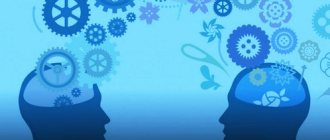Today, many people watch educational videos and TV shows, and the “fashion” for reading has returned again. Men and women try with all their might to improve themselves, to be a little smarter, wiser, more experienced than others. Everyone invariably associates the phrase “high intelligence” with something good, which is why the idea of possessing it is so tempting.
Is it enough to know enough to be considered smart? What is intelligence anyway? How is it measured, and what are the main signs of intelligence? After all, knowing a lot does not mean that you are an intellectual; here everything is a little more complicated.
What indicates high intelligence
1. Smart people often think about complex things that are usually of no interest to anyone.
For example, they have thoughts about the size of the Universe, the presence of an extraterrestrial civilization, or what will happen to the planet in a couple of hundred years. It is difficult to find a common language with such interlocutors, because they rarely discuss everyday problems.
Awareness and erudition
There are many television programs where people compete in erudition and prove their uniqueness and intelligence. So in life, every person tries to stand out, know more than others, share their own knowledge and experience.
Erudition indicates a good memory, but for high intelligence this may not be enough. You need to not only know certain information, but also be able to manage it. After all, being well-read is also a positive trait of a person; it speaks of his intelligence. But a large number of books read is not as important as the information gleaned from them and the meaning understood. A person with high intelligence can grasp the second semantic series of a work; he understands that it is better to read one “smart” book than a dozen “about nothing.”
The habit of being distracted from important matters by nonsense
When the brain must solve important problems, it has secondary thoughts and they interrupt the first ones. As a result, important tasks are completed later, but the brain processes hundreds of other ideas that train thought processes.
It is not necessary to have all of the above characteristics to be gifted; even a few are enough. But to be smart, you still need to develop your skills, this is the only way to achieve greater success.
Photo: Pixabay
Author: Sergey Tumanov
Concept
From Latin this word is translated as understanding, knowledge. Intelligence is the ability of our brain to understand and solve certain problems.
Plato was the first to raise the idea of the cult of intellect. In all his texts he attached great importance to thinking. He wrote that life without curiosity, the desire to learn new things, is impossible. Plato was fully supported by his student Aristotle, who developed the concept of the primacy of reason. He said that the one who has the inclination to rule should rule, and others should obey.
The level of mental abilities can be developed and increased, or it can be decreased. Academician Moiseev states that intelligence is the creation of a successful strategy, planning your steps, which will help you achieve your desired goal. This is the organization of one’s life and activities with the help of other abilities, which include: learning, thinking, the ability to classify, integrate, isolate unnecessary things, find connections and patterns.
The main properties of intelligence are:
- curiosity - the desire to learn something new, to explore phenomena;
- depth of mind - the ability to find the main and important things in a pile of information, and weed out the unnecessary;
- logic - consistency of reasoning, the ability to build reasonable and correct chains, taking into account relationships and details;
- mental flexibility - a person’s ability to use his capabilities, experience, knowledge, without using templates, but creating his own solutions to problems;
- breadth of thinking - the ability to fully study data, not lose information, see several solutions to a problem;
- critical thinking - the ability to evaluate the result of work, find the right ones and weed out the false ones, also the ability to change the path if it is not the true one;
- evidence of the mind is to find facts and use them at the right moment to make sure that the goal is correct.
In ordinary life, an individual always uses his thinking abilities to understand the world around him, take next steps and find the optimal solution. It is quite difficult to imagine even a day of life without the ability to analyze the situation and compare facts and objects.
Only through the thought process is there the possibility of self-development and personal improvement. Without intelligence, a person would not be able to make scientific breakthroughs, create cures for dangerous diseases, create music, or paint pictures.
Meditation as a brain exercise
Not long ago it became known that through meditation you can increase your IQ. This method, in addition to increasing intelligence, has the following qualities:
- helps reduce stress;
- improves mood;
- has a positive effect on mental health;
- promotes emotional balance.
Psychologist Siegfried Othmer, who studied this issue for thirty years, found the following: people who practiced meditation subsequently demonstrated a 23 percent increase in their intelligence level.
The main reason for the increase in IQ during meditation is that during practice, brain activity slows down, its plasticity and ability to self-reorganize increase. During meditation, a person focuses on music, breathing or a mantra and thereby gives the brain a rest, in return it begins to work better. It is worth noting that the study involved ordinary people who had not previously practiced meditation, and positive results began to appear on the fifth day of classes.
Experts advise: to get positive effects on intelligence and health, you need to meditate for at least 12 minutes daily.
Many people know the benefits of meditation, but, as a rule, it is not so easy to start. There are many programs and applications for this.
Recognized competence
In almost every organization there will be at least one person who is counted on more than everyone else.
This is Pareto's law in action. Have you ever heard of him? Sometimes it is also called the 80/20 principle. This is a rule of thumb, named after the economist and sociologist Vilfredo Pareto, which is most generally formulated as follows: “20% of effort produces 80% of the result, and the remaining 80% of effort produces only 20% of the result.”
There will always be employees who are more competent than others, due to experience or talent. When a colleague is judged to be very competent, this may be a sign of a clearly above average IQ.
You read your first book early
A British study of almost 2 thousand pairs of identical twins showed Stuart J. Ritchie, Timothy C. Bates, Robert Plomin. Does Learning to Read Improve Intelligence? A Longitudinal Multivariate Analysis in Identical Twins From Age 7 to 16 / Child Development: Despite identical genes, those children who began to read earlier have a higher IQ than their brothers and sisters by adolescence.
At first glance, this is easy to explain: children who learned to read early were simply smarter to begin with. However, researchers believe that the connection here is exactly the opposite. Children have become smarter because they became interested in books earlier. The craving for reading influenced their intellectual development.
So if you started reading early, it wasn't because you were smart. Perhaps you became this way because at a tender age you came across an entertaining book that forced you to learn how to put letters into words.
Do you have younger brothers or sisters?
Scientists from Norway analyzed data from 250 thousand people. It was possible to find out that the older children in the family often have much higher intelligence. According to the data obtained, the average IQ of the firstborn is 103 points, the second child is 100, and the third is 99.
An older child has an advantage in intelligence compared to his younger siblings. It was also found to be driven by interactions between children and parents.
It’s not immediately clear that these bugs are equipped with a “space suit” (photo)
“My son forbade it”: the star of “Morozko” Sedykh did not come to the funeral of her ex-husband
Correct geometry: classic dresses of the year that perfectly style your figure
Do you have an interesting hobby?
All famous geniuses had quite interesting hobbies. For example, Leo Tolstoy often rode a bicycle and worked out on the horizontal bar, Dmitry Mendeleev made suitcases.
Vladimir Nabokov caught butterflies with a net, and Vrubel loved to waste money senselessly.
Any meaningless pastime provides a good opportunity for the brain to rest and reboot. That is why it is very important to periodically focus on something as simple as possible after intellectual or creative work.
Rational thinking
Life does not stand still, it is constantly changing, in order to keep up with the times, you need to be able to adapt to new conditions. A smart person will not invent something new if there is no reason for it. He is able to show flexibility of thinking and rationality, and find another, simpler and more optimal way to solve a problem.
You need to be able to look at a problem from different angles, look for more than one solution, but have several backup options. A highly intelligent person can be critical of his decisions and thoughts, and be able to admit his own imperfections and mistakes.
He does not consider himself superior or smarter than others; he is able to adequately assess his own knowledge. Self-improvement and a thirst for knowledge will help you make yourself better. A person with high intelligence never stops there; he always strives for improvement.
Peculiarities
The human brain is a “muscle” that needs to be exercised regularly. In other words, the more effort and time a person is willing to invest in his development, the sooner new prospects for further self-realization will open up for him.
For example, if a person is able to concentrate on specific things, for noticeable visible results he needs to expand the field of activity over a certain period of time.
Periphery
It is undeniable that highly intelligent people are in the minority, they are often found on the periphery of social groups, not only because of differences in communication methods that can confuse other people, but also because of their internal need for new information. They often need solitude to digest the influx of data they encounter on a daily basis.
They may also feel that time spent in social groups does not expand their knowledge base, and that scenarios involving subjectivity and feelings—even positive ones—can be exhausting and counterproductive.
During a group project at university, you may notice that the more capable students watch neutrally, ready to either lazily submit to the group's ideas or chime in with particularly insightful thoughts.
Love cats more than dogs
In 2014, scientists conducted a study in which 600 students took part. All of them passed a test to determine the relationship between personal preferences and intellectual abilities.
How to Make Dehydrated Lemon Zest: An Easy Method
Funded by the city budget: restoration of the Gothic well at Orlov’s dacha
What color should you decorate your interior in 2022: the most fashionable options named
Unexpectedly, it turned out that those students who were dog lovers turned out to be more sociable and could adapt socially faster. But cat lovers had better cognitive abilities.











